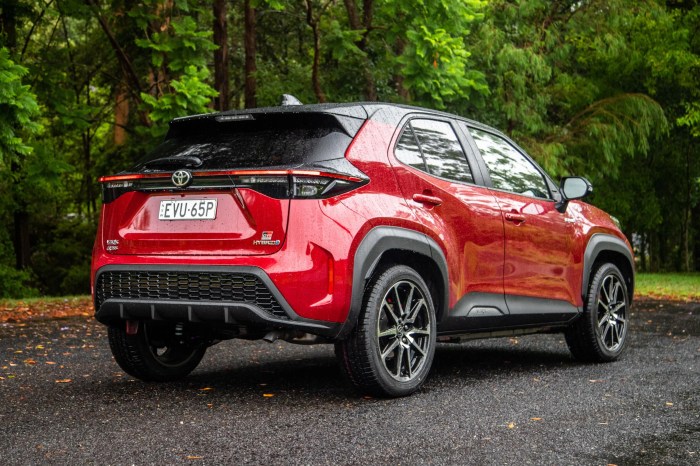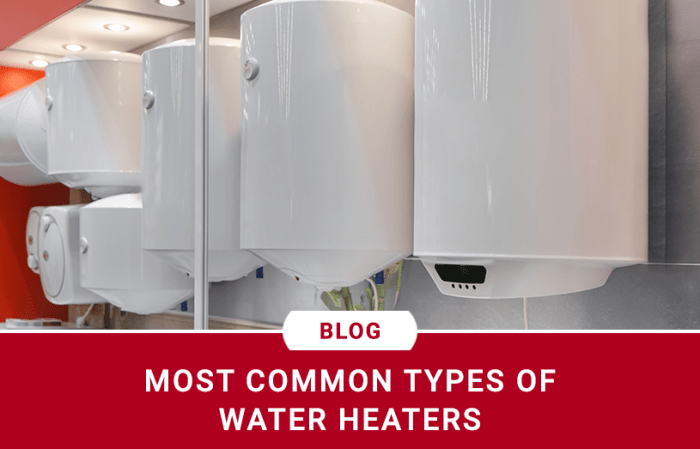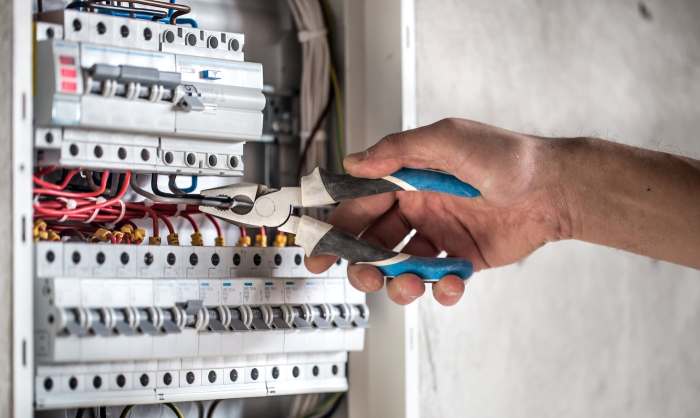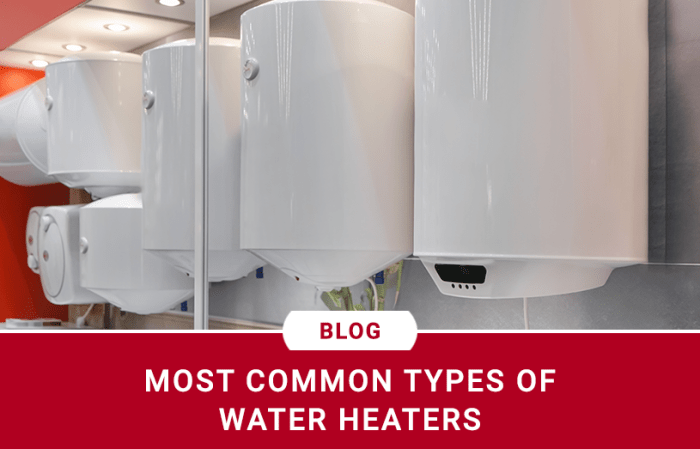Types of water heaters, from traditional tank models to innovative tankless options, each offering a unique set of pros and cons. This comprehensive guide delves into the diverse world of water heating, exploring the various technologies, their energy efficiency, and cost considerations. Understanding these differences is crucial for making an informed decision about your home’s water heating needs.
We’ll explore everything from the basic principles of operation for each type to detailed comparisons of their efficiency, costs, and maintenance requirements. We’ll also discuss the environmental impact of each choice and help you understand the crucial factors in selecting the perfect water heater for your specific needs.
Introduction to Water Heaters
Water heaters are essential appliances in most homes, providing hot water for bathing, cooking, and other household tasks. Understanding the different types of water heaters available is crucial for selecting the most suitable option based on individual needs and circumstances. This guide provides an overview of various water heater types, their working principles, and key factors to consider when making a purchase decision.Different water heater types utilize varying fuel sources and technologies, impacting their efficiency and cost.
The most common types include electric, gas, tankless, and solar water heaters. Each type operates on distinct principles, which we will explore in detail.
Choosing the right water heater depends on your needs, but proper blanket care is also important! Knowing the different types of water heaters can help you decide which one is best for your home. For example, if you’re unsure how to wash delicate blankets safely, check out this helpful guide on how to wash blankets. Ultimately, the best water heater will depend on your specific needs and budget, so do your research! Different models offer various features, so selecting the right one for your home is crucial.
Types of Water Heaters
Water heater types are categorized based on their fuel source and operating mechanisms. Understanding these distinctions allows for a more informed decision when choosing the right water heater for your home.
Choosing the right water heater depends on your needs, but sometimes a sticky situation arises, like jam or jelly stains on your appliances. Luckily, you can tackle those sticky messes with effective cleaning methods, like the ones detailed in this helpful guide on how to clean jam and jelly stains. Regardless of your chosen water heater type, a little preventative maintenance goes a long way! Electric, tankless, or gas— each has its pros and cons, and understanding them can make your choice easier.
| Type | Fuel Source | Efficiency | Typical Cost |
|---|---|---|---|
| Electric Resistance | Electricity | Generally lower than other types | Moderate, often competitive with gas models |
| Gas Tank | Natural gas or propane | Moderate to high, depending on the model | Variable, often lower than electric models, depending on fuel cost |
| Tankless (on-demand) | Electricity or gas | High, as they only heat water as needed | Higher upfront cost, but potentially lower running costs |
| Solar | Solar energy | High, especially in areas with abundant sunshine | High upfront cost, but potentially the lowest long-term operating cost |
Electric Resistance Water Heaters
Electric resistance water heaters use heating elements to directly heat the water within a tank. The simplicity of this design makes them relatively affordable. These heaters are common in areas with readily available and affordable electricity.
Gas Tank Water Heaters
Gas tank water heaters use natural gas or propane to heat water in a tank. They typically offer a good balance of efficiency and cost-effectiveness, especially in areas with readily available and affordable gas. These models often have higher efficiency ratings than electric counterparts.
Tankless Water Heaters
Tankless water heaters, also known as on-demand water heaters, heat water as it’s needed. They don’t store hot water, which eliminates the need for a large tank and allows for potentially higher efficiency, as they only heat water when required. This feature can reduce energy consumption compared to traditional tank models.
Solar Water Heaters
Solar water heaters utilize solar energy to heat water. They collect solar radiation to heat the water in a storage tank. These systems offer a sustainable and environmentally friendly approach to water heating. Their efficiency depends heavily on the amount of available sunlight. The initial investment can be significant, but the long-term cost savings, particularly in areas with abundant sunshine, can be substantial.
Electric Water Heaters: Types Of Water Heaters
Electric water heaters are a popular choice for many homeowners due to their affordability and availability. They provide a reliable source of hot water, but the efficiency and maintenance needs vary greatly depending on the specific type. Understanding the different types, their pros and cons, and energy efficiency is crucial for making an informed decision.
Types of Electric Water Heaters
Electric water heaters come in two primary types: tank and tankless. Tank-type heaters store hot water in a large, insulated tank, while tankless models heat water on demand. This distinction significantly impacts their energy efficiency, installation, and overall operation.
Tank Electric Water Heaters
Tank electric water heaters are the most common type. They are known for their relatively low upfront cost and ease of installation. These heaters typically maintain a constant temperature in the tank, ready to supply hot water as needed. However, this constant heating can lead to energy inefficiencies if not properly insulated or sized for the household’s hot water demands.
A larger tank, for example, will hold more water, but may not be as energy-efficient as a smaller tank properly sized to meet the household’s water usage.
Tankless Electric Water Heaters
Tankless electric water heaters, on the other hand, heat water only when it’s needed. This eliminates the energy loss associated with constantly maintaining a large tank at a high temperature. The instant heating capability can be convenient, but the system’s efficiency is greatly dependent on the electricity supply, and the cost of the installation can be higher. The upfront cost might be higher than tank heaters, but the long-term savings in energy consumption may outweigh the initial investment.
Consider the fact that tankless systems often need a dedicated circuit to prevent the possibility of tripping breakers due to the high demand.
Energy Efficiency Comparison
Tank electric water heaters generally have lower efficiency compared to tankless models. Tankless systems offer a more efficient method of heating water, as they only heat the water when it’s needed. The tank itself is a source of heat loss, whereas tankless systems eliminate this. For example, in a household with low water usage, a tankless electric water heater may prove to be an energy-efficient solution.
However, during peak usage times, the energy efficiency of a tankless system can vary, dependent on the power supply. The energy consumption of each depends greatly on the size of the tank and the amount of hot water used by the household.
Pros and Cons of Each Type
- Tank Electric Water Heaters
- Pros: Lower upfront cost, relatively easy installation, readily available.
- Cons: Inefficient if not sized properly, energy loss due to maintaining a large tank at a high temperature, limited hot water supply during peak usage.
- Tankless Electric Water Heaters
- Pros: Higher energy efficiency, no wasted energy maintaining a tank at high temperature, instant hot water availability.
- Cons: Higher upfront cost, potential for electrical issues if not adequately sized, more complex installation, and the possibility of not being compatible with certain homes.
Comparative Table of Electric Water Heaters
| Feature | Tank Electric | Tankless Electric |
|---|---|---|
| Installation Cost | Lower | Higher |
| Maintenance Requirements | Regular cleaning and anode rod replacement | Minimal maintenance |
| Average Lifespan | 8-12 years | 10-15 years |
Gas Water Heaters

Gas water heaters are a popular choice for many homeowners due to their affordability and efficiency. They utilize natural gas or propane as fuel sources to heat water. These systems are known for their reliable performance and ability to provide hot water quickly, although they do require regular maintenance and safety checks.
Types of Gas Water Heaters
Gas water heaters come in two primary types: tank and tankless. Understanding the differences is crucial for selecting the right system for your needs.
- Tank Water Heaters: These heaters store heated water in a large, insulated tank. They are a more traditional design, and while they are generally less expensive than tankless systems, they may not be as efficient. The water is heated and stored in the tank, which is typically located in the basement or utility room. This setup is more straightforward to install compared to tankless models.
A significant advantage is that you have a readily available supply of hot water, even if you have multiple people using it simultaneously.
- Tankless Water Heaters: These heaters heat water directly as it’s needed. They are more energy-efficient because they don’t waste energy storing water at a constant temperature. This is particularly beneficial for homes with fluctuating hot water demand. They are typically more expensive upfront, but the ongoing cost savings can make up for this difference over time. Installation may be more complex due to the need for specific venting and plumbing connections.
Safety Features in Gas Water Heaters
Safety is paramount with any gas appliance. Gas water heaters are equipped with several critical safety features to prevent accidents.
- Pilot Light and Ignition Systems: Modern gas water heaters often use electronic ignition systems to eliminate the need for a pilot light, which reduces the risk of gas leaks. These systems also provide more precise temperature control.
- Gas Leak Detectors: These devices automatically shut off the gas supply if a leak is detected, preventing potential explosions or fires. Regular inspections of these detectors are vital for their proper functioning.
- Temperature and Pressure Relief Valves: These valves prevent excessive pressure buildup within the tank, safeguarding the heater from damage and ensuring a safe operation.
- Proper Venting: Correct venting is crucial for removing combustion gases safely. Improper venting can lead to dangerous carbon monoxide buildup.
Operating Costs of Gas Water Heaters
The operating cost of a gas water heater depends significantly on its efficiency rating and the amount of hot water used.
- Efficiency Ratings: Energy efficiency is measured by the Annual Fuel Utilization Efficiency (AFUE) rating. Higher AFUE ratings indicate better fuel efficiency and lower operating costs.
- Usage Patterns: Families with higher hot water usage will experience greater operating costs compared to those with lower usage. Consider the number of people in the household and their typical water usage habits.
- Fuel Costs: The price of natural gas or propane fluctuates, impacting the overall operating costs. Using a lower-cost fuel source like natural gas in your region can result in lower bills.
Summary of Gas Water Heater Types
The following table summarizes the different types of gas water heaters, including their fuel efficiency and maintenance needs.
| Type | Fuel Efficiency (AFUE) | Maintenance Needs | Operating Cost |
|---|---|---|---|
| Tank Water Heater | Typically 80-90% | Annual inspections and potential parts replacement | Moderate |
| Tankless Water Heater | Typically 90-95% | Less frequent maintenance, potentially requiring cleaning and filter replacement | Lower, especially with high water usage |
Tankless Water Heaters
Tankless water heaters, also known as on-demand water heaters, are a modern alternative to traditional storage tank water heaters. They offer a more efficient and space-saving solution for many homes and businesses. Unlike traditional tank heaters that constantly heat water and maintain a certain temperature, tankless units only heat water as needed, eliminating the need to constantly maintain a large volume of heated water.Tankless water heaters operate on a different principle compared to traditional tank water heaters.
They use a heating element to rapidly heat water as it passes through a small pipe or tube. This means that hot water is produced immediately when a faucet or shower is turned on. The heat is generated in real-time, based on the demand for hot water. This eliminates the need for a large storage tank, resulting in a smaller footprint and potentially lower energy bills, especially in areas with high hot water usage.
Working Mechanisms
Tankless water heaters use a series of components to generate hot water on demand. A gas or electric burner heats the water as it flows through a small pipe. High-pressure pumps force the cold water through the heating element, and a heat exchanger transfers the heat from the burner to the water. The heated water is then delivered to the desired point of use.
Comparison with Traditional Tank Water Heaters
Traditional tank water heaters store a large volume of heated water in a tank. This stored water is constantly maintained at a certain temperature, resulting in energy loss due to heat escaping the tank. Tankless water heaters, in contrast, only heat water as needed, minimizing energy loss and maximizing efficiency. The demand-based heating approach makes tankless water heaters suitable for households with variable hot water demands.
“Tankless water heaters are significantly more energy-efficient than traditional tank water heaters, especially in homes with fluctuating hot water needs.”
Benefits
- Energy Efficiency: Tankless water heaters use less energy than tank water heaters because they only heat water when needed. This leads to potentially lower energy bills, particularly in households with high hot water demand.
- Space Savings: The absence of a large storage tank means tankless water heaters take up significantly less space than traditional tank water heaters, making them suitable for smaller homes or apartments.
- Instant Hot Water: Hot water is available immediately, unlike traditional tank water heaters where there’s a wait time to reach the heated water.
Drawbacks
- Higher Initial Cost: Tankless water heaters typically have a higher upfront cost than traditional tank water heaters.
- Potential for Low Water Pressure: In some cases, the high demand for hot water can potentially reduce water pressure, particularly in older plumbing systems.
- Maintenance Requirements: Tankless water heaters require regular maintenance, including cleaning and inspection, to ensure optimal performance.
Key Differences
| Feature | Tank Water Heater | Tankless Water Heater |
|---|---|---|
| Installation Complexity | Relatively simple | Potentially more complex, requiring specialized knowledge or professional installation. |
| Space Requirements | Requires significant space for the tank | Requires less space due to the absence of a large tank. |
| Water Heating Speed | Takes time to heat water; usually a wait time. | Heats water instantly on demand. |
| Energy Efficiency | Can be less efficient, especially if water is not used frequently. | More efficient, heating only when needed. |
| Cost | Generally lower initial cost. | Higher initial cost, but potentially lower running costs. |
Solar Water Heaters
Harnessing the power of the sun for heating water offers a sustainable and cost-effective alternative to traditional methods. Solar water heaters are gaining popularity worldwide due to their environmental friendliness and ability to significantly reduce energy bills. They’re a practical choice for homeowners seeking eco-conscious solutions for domestic hot water needs.Solar water heaters employ a combination of solar energy collection and water heating technologies.
Thinking about upgrading your water heater? There are different types, from tankless to traditional tank models, each with pros and cons. If you’re looking for a great deal, checking out Black Friday gifts under $50 might offer some surprisingly helpful accessories for your new water heater installation. Black Friday gifts under 50 could include things like extra-long hoses or a useful pressure gauge.
Ultimately, the best water heater depends on your needs and budget.
The collected solar energy heats the water within the system, significantly reducing reliance on conventional energy sources. This process is often more efficient than other water heating methods, especially in regions with abundant sunshine.
Working Principles
Solar water heaters utilize the sun’s energy to heat water. A system of solar collectors absorbs sunlight, transferring the heat to a storage tank containing the water. This heated water is then distributed to the household fixtures as needed. Sophisticated systems often incorporate thermal storage, allowing the collection and utilization of solar energy even when the sun isn’t directly shining.
Types of Solar Water Heaters
Different types of solar water heaters cater to various needs and conditions. Passive solar water heaters are the simplest design. They primarily rely on the natural movement of heated water within the system, driven by temperature differences. Active systems, on the other hand, use pumps to circulate the water, enhancing heat transfer and improving overall efficiency, particularly in areas with limited sunlight or for larger water demands.
Environmental Impact and Sustainability
Solar water heaters contribute significantly to a reduced carbon footprint. By substituting fossil fuel-based heating systems, they lower greenhouse gas emissions and promote a more sustainable lifestyle. The reduced energy consumption translates to lower environmental impact compared to traditional water heaters, leading to a smaller ecological footprint. Furthermore, they often use readily available and renewable energy sources, promoting energy independence.
Comparative Analysis of Solar Water Heater Models
| Model | Efficiency Rating (estimated % based on solar irradiance and water temperature) | Installation Cost (USD, average, including components and labor) |
|---|---|---|
| SunSmart Pro | 65-75% | $2,500 – $3,500 |
| EcoFlow Max | 70-80% | $2,800 – $4,000 |
| SolarStream Standard | 60-70% | $2,000 – $3,000 |
| SunPower Elite | 75-85% | $3,500 – $5,000 |
Note: Efficiency ratings and installation costs are estimates and may vary depending on factors like location, installer, and specific system configurations.
Heat Pump Water Heaters

Heat pump water heaters are a relatively new technology that’s quickly gaining popularity due to their impressive energy efficiency. Unlike traditional water heaters that rely on heating elements, heat pump water heaters use a refrigeration cycle to extract heat from the surrounding air and transfer it to the water. This innovative approach significantly reduces energy consumption and operating costs compared to other options.Heat pump water heaters work by using a refrigerant that absorbs heat from the air and transfers it to the water within a closed loop system.
The refrigerant, which is typically a non-toxic substance like R-410A, changes state (from gas to liquid and back again) to absorb and release heat. A compressor and other components are integral to this process, and the water tank itself acts as the heat exchanger. The efficiency of this process depends largely on ambient air temperature. Warmer temperatures allow for more efficient heat extraction, leading to lower energy consumption.
Energy Efficiency
Heat pump water heaters are exceptionally energy-efficient, typically using 30-60% less energy than traditional electric or gas water heaters. This efficiency translates to substantial savings on utility bills, especially in regions with moderate climates. The efficiency is often measured by the Energy Factor (EF) rating. A higher EF indicates a more efficient water heater. For example, a heat pump water heater with an EF of 9.0 will use 9 units of energy to heat 100 gallons of water, while a traditional electric water heater with an EF of 1.0 will use 10 units.
This significant difference in energy consumption contributes to substantial cost savings over the long term.
Operating Costs
The operating costs of heat pump water heaters are considerably lower than those of traditional water heaters. While the upfront cost might be slightly higher, the long-term savings on energy bills typically offset this difference within a few years. The cost comparison depends on factors such as energy rates, local climate conditions, and the specific water heater model.
In areas with higher electricity prices, the cost savings might be less pronounced. For instance, a household in an area with relatively low electricity rates could experience a more substantial return on investment from a heat pump water heater than a household in an area with high electricity rates.
Climate Suitability
Heat pump water heaters excel in climates with moderate temperatures, where they can extract sufficient heat from the air to maintain optimal performance. In very cold climates, their efficiency may decrease due to the reduced availability of ambient heat. However, even in colder climates, they still offer substantial energy savings compared to traditional water heaters, particularly if paired with insulation and other energy-saving measures.
In hot climates, heat pump water heaters can still be very efficient, utilizing heat from the surrounding air to heat the water, while in very cold climates, the amount of heat that can be extracted from the air is reduced, resulting in less efficient performance.
Comparison Table
| Feature | Heat Pump Water Heaters | Electric Water Heaters | Gas Water Heaters |
|---|---|---|---|
| Lifespan | 10-15 years (with proper maintenance) | 8-12 years (with proper maintenance) | 10-15 years (with proper maintenance) |
| Maintenance Requirements | Regular filter cleaning and refrigerant checks (typically every 2-3 years) | Annual anode rod replacement and occasional element cleaning | Annual burner and vent inspections and occasional tank cleaning |
| Installation Complexity | Moderate, requires professional installation to ensure proper venting and electrical connections | Relatively simple, can be installed by a qualified technician | Relatively simple, can be installed by a qualified technician |
Choosing the Right Water Heater
Selecting the ideal water heater for your home is a crucial decision that impacts both your comfort and your utility bills. It’s a long-term investment, so careful consideration of various factors is essential. This choice hinges on understanding your household’s needs, energy costs, and the overall performance of different types of water heaters.Understanding your water usage patterns, the size of your household, and the prevailing energy costs in your area will help you make the most informed decision.
A poorly matched water heater can lead to wasted energy and higher expenses, while a well-chosen one can significantly reduce your long-term costs.
Factors to Consider in Water Heater Selection
Several key factors influence the optimal water heater choice. These factors, when weighed against each other, can help determine the most suitable option for a particular household. The type of fuel, capacity, and efficiency are all critical components.
- Water Usage: Understanding your household’s daily water consumption is paramount. Families with larger numbers or those with high-water-using habits (e.g., frequent bathing, multiple dishwashers/laundry machines) require larger tank capacities or tankless systems to meet their needs without frequent re-heating. A small household with minimal water usage may find a smaller, more efficient tank-style heater to be sufficient.
- Household Size and Composition: The number of people in your household significantly impacts water heater capacity requirements. A family with multiple children and adults likely needs a larger tank or tankless system to ensure hot water is available for everyone. A smaller household may find a smaller, less expensive model sufficient.
- Local Energy Costs: Energy costs vary greatly by region. The cost of electricity, natural gas, or propane directly impacts the long-term running expenses of different water heater types. In areas with high electricity prices, tank-style electric heaters might not be the most economical choice, while in regions with cheap natural gas, a gas water heater could be very affordable.
- Water Heater Type Comparison: Each type of water heater has unique strengths and weaknesses. Comparing these aspects is essential. Tank heaters provide constant hot water, but require more energy to heat and maintain the temperature. Tankless heaters, on the other hand, provide hot water on demand, minimizing standby energy use but can sometimes have limitations in peak demand situations. Solar and heat pump systems are more environmentally friendly but may require more initial investment.
Considering your budget and lifestyle is crucial when evaluating different water heater options.
Detailed Comparison of Water Heater Types
A crucial aspect of the decision-making process is understanding the distinct characteristics of each type of water heater. This involves evaluating the long-term costs, efficiency, and suitability for various households.
- Tank Water Heaters: These heaters maintain a tank of hot water, providing constant access. They are generally affordable but may consume more energy than tankless options, particularly if not insulated well.
- Tankless Water Heaters: These systems heat water only when needed, making them more energy-efficient than tank-style heaters. They are a good choice for households with fluctuating water usage, but they may not be ideal for situations requiring a high volume of hot water at once.
- Solar Water Heaters: These systems use solar energy to heat water, providing a more sustainable and potentially cost-effective solution. However, their performance depends heavily on sunlight availability and may not be viable in regions with low solar radiation.
- Heat Pump Water Heaters: These systems use electricity to transfer heat from the air to the water. They can be very energy-efficient, particularly in moderate climates, but may require a higher initial investment.
Summary Table, Types of water heaters
| Factor | Tank | Tankless | Solar | Heat Pump |
|---|---|---|---|---|
| Budget | Moderate | High | High | High |
| Water Usage | Moderate to High | Low to High (depending on demand) | Moderate | Moderate |
| Climate | Suitable for most climates | Suitable for most climates | Best in sunny climates | Best in moderate climates |
Water Heater Installation and Maintenance
Keeping your water heater in top condition is crucial for both its longevity and your comfort. Proper installation ensures optimal performance and safety, while regular maintenance prevents costly repairs and potential hazards. This section will detail the installation process, highlight the importance of maintenance, and provide troubleshooting steps for common issues.
New Water Heater Installation
The installation of a new water heater is a significant undertaking, best left to qualified professionals. Improper installation can lead to leaks, gas leaks (if applicable), and electrical hazards. Hiring a licensed plumber or HVAC technician ensures the installation adheres to local codes and safety standards. A crucial part of installation is ensuring proper venting, especially for gas water heaters, to prevent carbon monoxide buildup.
The correct water pressure and connection to the plumbing system are vital for the heater’s efficiency and lifespan.
Importance of Regular Maintenance
Regular maintenance significantly extends the lifespan of your water heater. It prevents costly repairs by catching potential problems early. This proactive approach helps maintain optimal performance, reducing energy consumption, and improving hot water availability. Addressing minor issues promptly prevents them from escalating into major breakdowns. Routine checks and maintenance procedures can detect leaks, corrosion, and sediment buildup, all of which can significantly impact the heater’s longevity and energy efficiency.
Common Maintenance Procedures
Regular maintenance tasks include checking the anode rod for corrosion and replacing it as needed. This protects the tank from corrosion. Inspecting the water heater’s electrical connections (if applicable) and ensuring they are secure is also crucial. Cleaning the drain valve and sediment buildup is vital for maintaining efficiency and preventing pressure fluctuations. Checking gas connections (if applicable) for leaks and ensuring proper venting is critical for safety and optimal performance.
Consult your water heater’s manufacturer’s instructions for specific maintenance recommendations.
Troubleshooting Common Problems
Various problems can arise with water heaters. Identifying and addressing these issues promptly is crucial to avoid significant damage and ensure consistent hot water. Different types of water heaters may exhibit unique issues, so understanding the specific problems associated with each type is beneficial. Troubleshooting involves identifying the symptoms and applying appropriate solutions.
Common Water Heater Problems and Solutions
| Problem | Possible Causes | Solutions |
|---|---|---|
| Low water temperature | Sediment buildup, faulty thermostat, faulty heating element, low water pressure | Flush the tank, clean sediment, replace thermostat or heating element, check water pressure |
| No hot water | Faulty heating element, tripped circuit breaker, low water pressure, gas supply issue (if applicable) | Check circuit breaker, check water pressure, replace heating element, check gas supply (if applicable) |
| Water heater leaking | Damaged tank, faulty valve, loose connections, corroded anode rod | Repair or replace damaged tank, repair or replace faulty valve, tighten loose connections, replace corroded anode rod |
| Strange noises | Sediment buildup, loose parts, faulty heating element | Flush the tank, tighten loose parts, replace heating element |
| Water heater is not heating | Faulty heating element, low gas pressure (if applicable), tripped circuit breaker, electrical issues | Replace heating element, check gas pressure, check circuit breaker, check electrical connections |
Environmental Impact of Water Heaters
Choosing the right water heater isn’t just about comfort; it’s about minimizing our impact on the planet. Different water heater types have varying environmental footprints, influenced by energy consumption, resource utilization, and emissions. Understanding these differences allows us to make informed choices that contribute to a more sustainable future.The environmental impact of water heaters extends beyond the carbon footprint.
Resource depletion, from the extraction of raw materials to the manufacturing process, plays a role. Factors like energy efficiency, the type of fuel used, and the overall lifespan of the heater all contribute to the overall environmental burden. Understanding these elements allows for better choices and ultimately a reduced impact.
Carbon Footprint Comparison
The carbon footprint of water heaters varies significantly depending on the type. Fuel-based heaters, such as gas water heaters, release greenhouse gases during operation. Electric water heaters, while not directly emitting greenhouse gases during operation, rely on electricity generated from various sources, each with its own environmental impact. Tankless heaters, although often more energy-efficient, still contribute to the overall carbon footprint depending on their energy source.
Solar water heaters offer a more sustainable approach by harnessing renewable energy.
Energy Consumption and Resource Utilization
The energy consumption of water heaters is a crucial factor in assessing their environmental impact. Different technologies have varying levels of efficiency, leading to differences in energy use and associated costs. For instance, a highly efficient tankless water heater can significantly reduce energy consumption compared to an older, less efficient model. Moreover, the raw materials used in the manufacturing process also contribute to the environmental footprint, as does the disposal of the unit at the end of its life cycle.
Minimizing Environmental Impact
Several strategies can help minimize the environmental impact of water heater use. Switching to a more energy-efficient model is a key step. Installing a tankless water heater or a solar water heater can significantly reduce energy consumption. Proper maintenance of existing water heaters can also extend their lifespan and improve efficiency. Using water-saving appliances and practices like shorter showers can significantly reduce the overall water heating demand.
Water Heater Environmental Impact Table
| Water Heater Type | Carbon Footprint (Estimated, relative to electric) | Energy Consumption (Estimated, relative to electric) | Resource Utilization (Estimated, relative to electric) |
|---|---|---|---|
| Electric | Low (considered base for comparison) | Moderate | Moderate (depending on electricity source) |
| Gas | Medium to High | Moderate to High | High (natural gas extraction) |
| Tankless | Medium (depending on energy source) | Low | Moderate (depending on energy source) |
| Solar | Low | Low | Moderate (initial investment) |
| Heat Pump | Low | Very Low | Moderate |
Note: Values in the table are estimations and can vary depending on factors such as the specific model, installation, and energy source. Data for resource utilization considers the entire life cycle, from manufacturing to disposal.
Concluding Remarks
In conclusion, choosing the right water heater is a significant decision with long-term implications. This guide has provided a comprehensive overview of the available options, highlighting the key differences between each type. By considering factors like energy efficiency, cost, maintenance, and environmental impact, you can confidently select a water heater that aligns with your budget, lifestyle, and sustainability goals.
Ultimately, the ideal choice depends on your unique situation and priorities.






